Service dogs and their handlers are thoroughly protected in the US, so why are many handlers still confronted by suspicious employees and store patrons when out in public?
This confrontational behavior doesn’t just include experiences at dining establishments and in stores, either; it also extends so far as to include unknown people on sidewalks, in parking lots and in any number of other public places. In our Service Dog Accessibility survey a couple of years ago, almost three-quarters of service dog owners said they had been asked illegal questions.
For service dog handlers, being publicly approached and interrogated can be a frustrating and demeaning experience. Although most people in the United States would agree that discrimination against disabled individuals is unethical, statistics demonstrate that disabled individuals are still significantly more likely to face discrimination – in employment, healthcare and more – when compared to non-disabled individuals.
It is important for service dog handlers to understand the laws which protect them from unfair treatment in public, since the ADA’s laws regarding service dog rights are not universally known or taught to most employees. Just as no legitimate service dog certification exists within the United States, and just as service dog handlers do not need to carry ‘papers’, members of the public (including staff at businesses) are not legally allowed to ask you anything other than two questions regarding your disability or your service dog.
What are the two questions that service dog handlers can be asked?
The American with Disabilities Act (ADA) of 1990 is an American civil rights law which protects service dogs and their handlers from public discrimination. The ADA is very specific regarding the rights that service dog handlers possess within the United States, and it is imperative for every service dog handler to fully understand these rights.
It is against the law to mistreat or discriminate against a service dog handler, and this mistreatment includes asking them any questions – other than the two which are specified by the ADA – regarding their dog or their disability.
So, which questions is it legally allowed to ask a service dog handler? As per ADA.gov, if it is not obvious which services an animal is providing to their handler, staff within a business may ask the handler:
- Is this service dog required because of a disability?
- Which work, or tasks, has this dog been trained to perform?
That’s it. Staff can not legally ask a service dog handler any other questions regarding their dog or their disability.
Which questions cannot legally be asked of a service dog handler?
Here are some examples, but by no means a complete or exhaustive list, of questions members of an establishment cannot legally ask a service dog handler:
- Are you disabled?
- What is your disability?
- You don’t look disabled, do you have proof?
- Is your dog certified?
- Can I see your dog’s certification paperwork?
- Can I see your dog’s service dog registration card?
- Where was your dog trained?
- Why isn’t your service dog wearing a vest?
- Can you prove to me that this is a service dog?
- Can I see some examples of the tasks that this dog was trained to do?
- Do you have medical documentation or a doctor’s note?
This is only a brief list of examples, but literally anything apart from the two aforementioned questions (regardless of how legitimate or genuine they may seem) is illegal to ask a service dog handler.
If you are a service dog handler who would feel more comfortable being able to present something to people who may ask you intrusive questions, you can print these questions out and carry them with you, or you can purchase an ADA legal rights card online. But this is by no means necessary, as your legal rights are enshrined regardless.
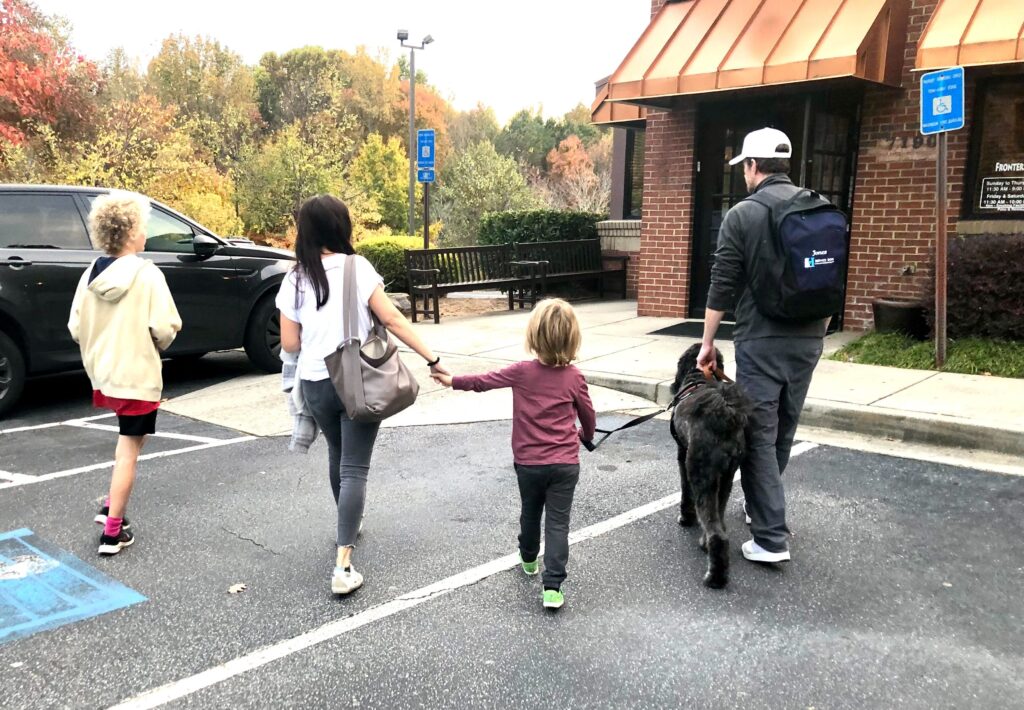
When can a business legally remove a service dog from their premises?
Although the rights protecting service dog handlers are extensive in the US, there are a couple of instances where the ADA specifically mentions that an establishment can legally remove a service dog from its premises. These instances include:
- The service dog is out of control and the handler does not take effective action to control it. Out of control behavior can include (but is not limited to): repeated barking; aggressive behavior; destruction of property, including knocking merchandise off shelves; chewing on food or products; lunging at or jumping on people, etc.
- The dog is not housebroken. Marking related urination is included here.
If a service dog is acting in any way which endangers the public or creates an obvious nuisance, an establishment can legally demand that a handler obtains goods or services without the animal’s presence. The ADA is very specific regarding the fact that service dogs must be under control at all times, and must be attached to a leash unless an individual’s disability requires that the dog is off-leash in order to effectively accomplish trained tasks.
Which types of establishments are not exempt from service dog protection laws?
Most establishments open to members of the public must abide by the ADA’s service dog laws. There are a couple of exceptions, but there are many facility types which may seem like they would be exempt but are not. Some examples include:
- Schools and universities
- Movie theaters and performing arts centers
- Food establishments
- Hotels
- Museums and aquariums
- Zoos
- Hospitals
Occasionally, employees at these businesses may voice concerns regarding allergies, and the fact that other patrons may have them. Legally, a service dog cannot be removed from a premises because other patrons have an allergy to them. In situations such as dining arrangements, it is the responsibility of the business to try and make distance between the allergic person and the service dog handler if possible.
It is also illegal to separate service dog handlers from other patrons, or to charge them fees because they are handling a dog. In facilities such as hotels (which typically charge a pet fee), this fee must be waived for service dogs. In this same instance, however, these places are allowed to charge for any damages to their property which have been caused by a service dog.
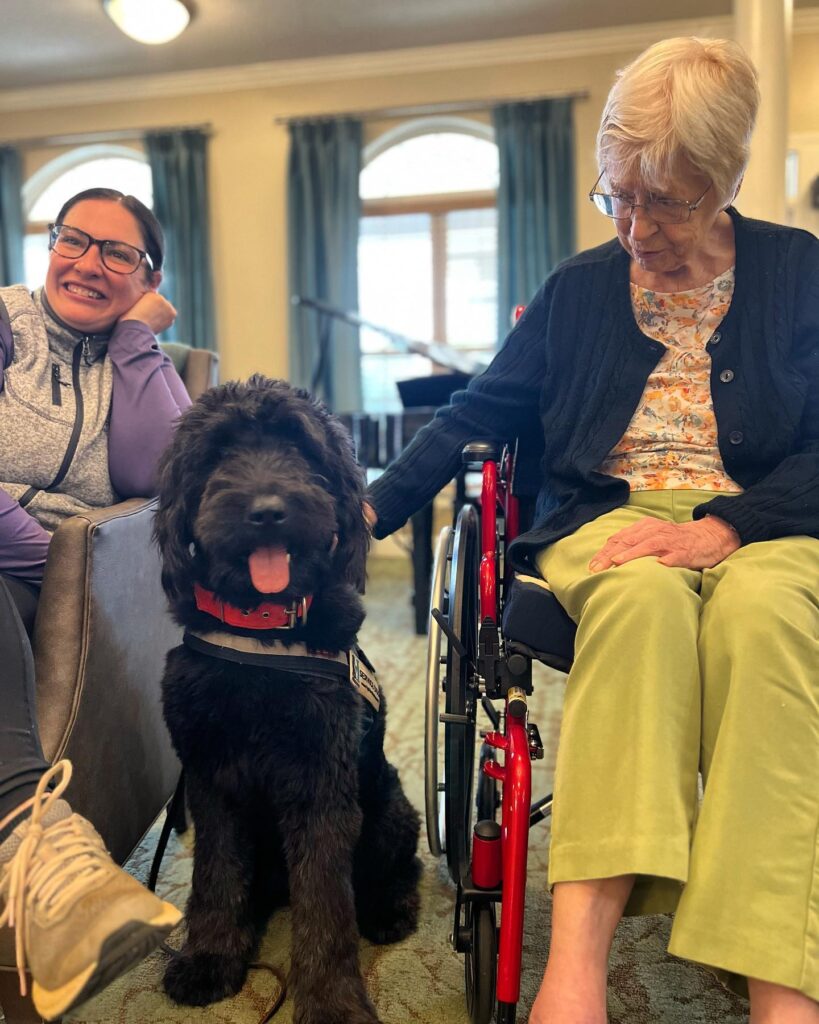
Which places in the US are exempt from service dog protection laws?
The ADA specifically states that although service dogs are allowed to accompany their handler in most places where the public is allowed, there are certain exceptions to this rule. The types of establishments exempt from ADA laws include:
- Public swimming pools. Although service dog handlers are allowed to bring their dog into a hotel or gym, a service dog is not allowed to enter the facility’s public pool.
- Churches, temples, synagogues, mosques and other places of worship. Although these places are not obligated to accept entry of service dogs, handlers may ask the establishment directly for an exception. This being said, the establishment has no obligation to make this exception.
There are a few types of establishments which are not covered by the ADA, but where service dogs may be permitted by other laws:
- Federal agencies. Although these are not covered by the ADA, the Rehabilitation Act of 1973 does protect the rights of people with disabilities to participate in federal programs and services.
- Commercial airlines. Although sky travel is not included in the list of service types which service dogs are permitted to enter, the Air Carrier Act does protect the rights of people flying with their service dog.
- Rented residential properties. The ADA only protects service dogs if they are entering housing programs run by state or local governments, or if they are providing public accommodation. The Fair Housing Act, however, is applicable to nearly every type of accommodation, and requires housing providers to permit the entry of service dogs.
Although service dogs are permitted to stay in hotels with their handlers, they cannot be left unattended in the room.
When should you clarify service dog entry rules ahead of time?
There are certain situations where laws regarding service dog entry may be vague or variable. In these instances, it is always the responsibility of a service dog handler to research legal specifics, or call someone who can help them determine if their service dog is permitted entry. Some of these situations include:
- International air travel
- International cruises
- Places of worship
It is important that service dog handlers fully understand the laws which protect them from discrimination of all forms, including being refused entry because they are accompanied by a service dog.
The ADA provides comprehensive protection of service dog handlers and their civil rights, and these rights must be respected by the public. The two questions mentioned in this article are the only questions that staff can legally ask a service dog handler, but due to widespread confusion regarding service dog laws, it may be up to a service dog handler to inform a staff member about their rights.
If you are a service dog handler who feels that they have been discriminated against or mistreated by a public entity, you may contact the US Department of Justice to file a complaint.
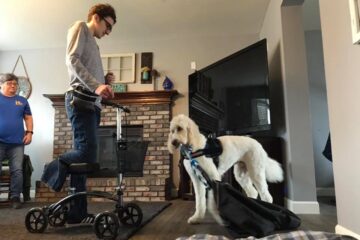
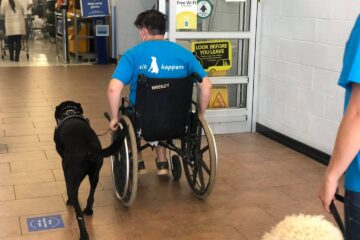
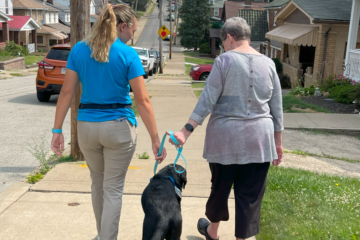
0 Comments